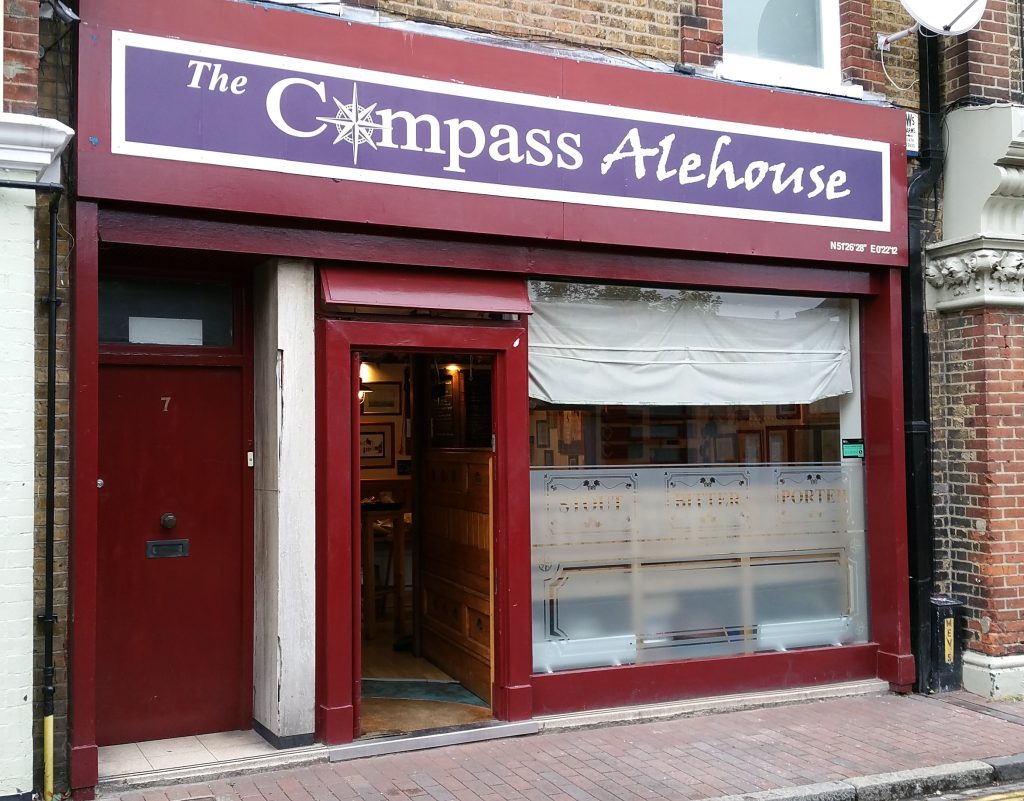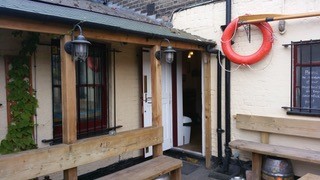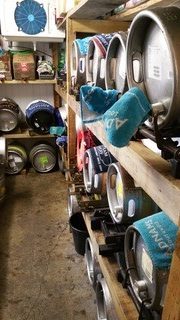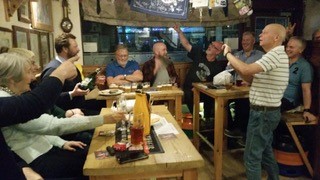Going in the right direction
What does it take to run a successful micropub? And for that matter what qualifies as a micropub these days? This was something we were mulling over during a recent visit to one of our locals. In case you’re wondering it was a pint of Vibrant Forest’s Cambrian Root – possibly the best stout we’ve tasted to date.
It’s safe to say micropubs are becoming mainstream. We’ve recently added the 500th micropub to our directory and we know there are many more we’re missing, but at the same time we’re aware of quite a few that’s shut the last few years and currently a handful of micropubs that are up for sale. So it’s not always a recipe for success nor printing money, but then as most successful owners will tell you it never was about making money.
Well, the best way to find the answers to those questions is to ask those in the know, and who better than the owner of a micropub that’s been going for over five years. John Warden started The Compass Alehouse, then the first micropub in Gravesend, back in 2014 with some friends whilst still juggling their day jobs. Sticking (mostly) to the core micropub values has worked well for them, but at the heart of their success lies what we believe is the most important thing about a successful micropub, serving well kept, quality beer, looked after by somebody with a passion for it. From dealing with the inevitable nightmare of planning permissions to tackling that tricky question of what is a micropub, John’s shared his experience below.
So grab a pint, sit back, and read on for The Compass’ story (if reading this on your phone in your local just tell them it’s valid research!).

UK Micropubs: Hi John, thanks for your time. So can you tell us what you were doing before you started The Compass Alehouse?
John Warden: Before opening the Compass I was a psychiatric occupational therapist working in an acute inpatient unit. My wife is an artist and runs a toddler group. The other couple we started with were both psychiatric nurses.
UKM: Right, I guess moving from a being a psychiatric therapist to a micropub owner is quite a side step in direction and must have been a rather daunting experience! Did you or your business partners have any experience in the pub or beer industry before then?
JW: I managed a pub while going through college, as I’m sure many have. This gave me some insight and interest into the industry. While at University I did dabble with home brew, but had very inconsistent and often disappointing results. My love of ale sprung from this time, and a close friend of mine (nothing to do with the Compass) and I spent many nights compiling lists of beers we had drunk and marked them according to our tastes and experiences. This was back in the 90’s and long before the internet was the accessible thing it is today (certainly no phone apps). I have dabbled with brewing ever since. The first time I used a commercial kit was after we opened the Compass in 2014, with a local microbrewery which has now evolved into Iron Pier Brewery and I still get on well with the head brewer.
It was not such a daunting experience, as it was a partnership and I was still working full time for the NHS for the first year. Fitting in the hours was the hardest thing, often putting in a 70-80 hour week, there are a lot of transferable skills between a psychiatric therapists and running a micropub, but with those hours I did sometimes lose track of where I was running a group therapy session!
UKM: What made you decide to start a micropub?
JW: It’s very simple, getting a consistently well-kept and/or interesting real ale nearby was nigh on impossible. The micropub concept was actually introduced to us by a head brewer of a local brewery where we used to get wet yeast for our home brew. His partner owns and runs the Paper Mill micro in Sittingbourne. It was time to put up or shut up and have a go!
UKM: Are all four of the original partnership still involved in the day to day running of the micro?
JW: No two of us still run the Compass with help from Terry, our Sunday saviour. One of the other couple still remains on as a director and the fourth has left.
UKM: How did you come up with the name?
JW: It was a symbol for the change of direction in our lives and a device that had played a large part in our lives.

UKM: It’s probably a distant memory now, but tell us what you remember about the planning and licensing application process?
The licensing process was quite straightforward. We completed the personal licence course, and spent time with the local authority licensing committee explaining the concept etc. There were very few micropubs at this time and it was a new concept for the local authority to understand. Once licensing understood they were very helpful and almost wrote the application for us. Unfortunately the planning department were a completely different matter. They would not speak to us and resultantly would highlight completely irrelevant issues. They failed to complete the advertising of the ‘change of use’ correctly and only realised after the 28 days that it had to run. This then caused another 28 day delay as they re-advertised it. They made restrictions that we had to adhere to, such as soundproofing etc which were fine, but then wanted to charge us to do a site visit to sign off the work! They caused an awful lot of money to be wasted in delays such as rent before we could open jeopardising the whole idea at the start.
UKM: How are you choosing what beers and breweries to work with?
JW: A lot of this is personal experience, I have been brewing and drinking real ale since the age of 18. There is also the arduous task of visiting breweries, ale festivals and conferences. We won’t use a brewery until we have tried and liked their beer, or it comes with a high recommendation from a trusted source. Then of course there is the small matter of selling over 2000 beers in the last five years. Price is not a huge factor, but quality is!
UKM: You’ve been going for over five years now and with 60% of small business failing within three years you must have been doing something right, so from a business perspective what has been the secret of your success?
JW: Not as easy to answer as you might expect. If things go wrong you learn from them, if they go right should you change them? Are you doing it right or just being lucky? Having said that there are some very important core values for us;
- Get the beer right.
- Be honest.
- Know your product.
- Keep on top of your accounts, and or get a good accountant who will work with you.
- Set goals and standards aim for them, but try to be flexible if things don’t work.
Oh and we do like people to feel welcome, the Compass really is a community micro.
UKM: And from a micropub perspective what do you think has been the biggest factors that lead to you succeeding?
JW: Learning about looking after the different styles, understand and talk with breweries so you look after their beer the way they want it looked after, don’t rush beer, and keep it in a constant environment. Don’t lie about things if you don’t know, don’t tell people beer is right when it isn’t! How many ale drinkers know what diastatic infections tastes like, when a yeast is not happy, when a beer is oxidised or any number of reasons a beer could be off?
The Compass is an alehouse. We know real ale, we serve it on gravity from the cask in a temperature controlled environment, with many new ‘micropubs’ serving more keg than cask and diversifying the theme, cared for real ale is becoming rarer to find, not easier. The Compass started through a passion for real ale, not as a hobby, retirement plan, or as a club. Rant aside we have a real community of people who look for a quality product in a welcoming and safe environment, our customers are friends and are part of what we do, they help out when we are busy and cover for us when help is needed.

UKM: It’s great to see how passionate you are about real ale and as you rightly point out, a lot of micropubs are diversifying these days. Personally we have seen the big shift towards keg and also “craft” beers being served in micropubs, but at the same time pub owners need to do what they can to survive. We’ve seen micropubs putting up TVs for major sporting events and many are now hosting regular quiz nights, live music and other entertainment (although fortunately no reports of fruit machines in sight! Yet). It’s something we are constantly struggling with ourselves as it put us in a rather difficult position of defining what exactly a micropub is these days and whether they should be listed on our website or not. Which is our own little rant.
So in your eyes just what does the term “micropub” mean these days and what makes it different from just being a small free house pub or bar? Does it matter to want to stick a label to it?
JW: Yeah the use of the term micropub has become somewhat out-modded. I don’t envy you, as there will always be someone who disagrees. Their reason for doing so may actually be a good guide as to where to draw the line. If you look back to Martyn Hillier’s first concept it is quite clear, however I know he uses a TV to show rugby matches, stating the he is not a micropub when he does, and returns to being one when the match is over and the TV is off. We are not in some respects a true ‘micro’ due to our extensive range of whiskies, whisky tasting evenings, Belgian beers and Belgian beer tastings. However our heart is in the cask ale. If you do not stock cask ale, on gravity, looked after to a high standard and offer a range to include pales, red/brown/amber and black in my view you are taking advantage of the ‘micro’ concept to run a small drinking establishment. Yes we have other policies that we choose to follow, such as no phone calls, no music, no gambling machines and no lager because this makes for a better environment to enjoy your real ale and these follow the micropub concept and they work. I find it is very disappointing to go into micropub and the real ale is awful, there is music and loud often aggressive individuals drinking lager. Fine if you want to open a small pub and make some money, but don’t get upset if you are not described as a micropub, or maybe if you do set your stall at real ale, call yourself an Ale House, I know which one I’ll visit! So I guess I am saying it does matter to label things so that the customer knows what to expect.
UKM: Over the last 5 years what has surprised you the most with running a micropub?
JW: I would have to say how people take pride in being part of something. Our customers ‘police’ the place themselves (we have since day one run a no phone calls and silent mobile phone policy but not a no swearing policy, and yet our customers enforce both these themselves). They will offer seats to new customers, even offer a taste of their beer to strangers. Make food to bring in, collect and clean glasses when we are overwhelmed. I cannot overstate how proud it makes us.

UKM: Every micropub seem to have their colourful characters – tell us a bit about yours, no need to name names!
JW: Well yes, we do have a few, those who insist that every conversation should be held at their pace and on their topic of interest, those who’s sense of humour can push any and all boundaries for polite company. The know it all’s and the done it all’s, and those who are oblivious to how socially inept they are, and that is not mentioning how they all believe the customer is always right, despite knowing me for five years now. But yes there is one who stands above the rest who we have nicknamed the ‘Father of the House’, he will arrange where people are sitting, give people guided tours, has personally filled our library, and carries a wealth of knowledge on all subjects.
UKM: What are your plans for The Compass Alehouse in 2020, and beyond?
JW: In simple terms, keep doing what we do, More Belgian beer tastings, specialist ale tastings, whisky tastings, beer festivals and above all keeping the quality. We are not looking to take over the world, start an empire, or become a brand.
UKM: What advice would you give to anybody thinking about starting a micropub?
JW: Do it your way. I know I have ranted about new micros moving away from the passion for real ale that was part of the origins but at the end of the day you have to do what you want and enjoy. If you don’t the motivation will go and all else is wasted. I do fear for the longevity of real ale and for micropubs, which are becoming so diverse that they are in danger of becoming just like normal pubs and becoming meaningless, but we live in the real world. Just make sure you do your research into the product and how to keep it, oh and brace for the shear despair that is trying to get through planning permission.
We want to thank John for his time and wish The Compass all the best for the future.
And in case you’re wondering Diastaticus is basically a yeast infection for beer, and no we don’t know what it tastes like.

Like to praise UKM for asking the ‘right’ questions and John for being totally honest.
We’ve also been going since 2014 and it is important to do things your way. We’ve had a few customers, that are ex landlords of regular pubs stating, ‘oh I wouldn’t have done that or this’. They just do not get it. Having stuck to our guns and like John says ensuring that the beer is right and giving everyone a warm welcome is what works. If you serve good beer people don’t always comment on it but you be damn sure if someone experiences a beer that’s off, they will tell everyone.
Thanks Jay. I agree, at the end of the day the primary focus for any good and successful micropub must be serving good beer. Consumers are a lot more vocal than they used to be and a lot more picky, and I think rightly so. If I’m walking into my local and expected to pay upwards of £10 for a pint and a large glass of wine I want to know that its’s good value for money. That’s not a complaint about the cost of a beer and a glass of wine, it’s about the value of it. I fully understand having to charge me say £5 for a stout and as a customer I’m happy to pay that when I know what I’m getting is something that’s been crafted by somebody that cares, on a small scale, most likely relatively local to me and looked after and served by somebody that cares about and understands the product. And I for one am very pleased people like John and yourselves live by this!
Thanks Jay, and UK Micropubs. It was a pleasure to do the interview, but always a concern about offending people. If I had a £ for every time somebody told me I would be successful if I did x or y, well I’d still be running an Alehouse but not worried so much about profits! most of these people however, when asked if I could visit their establishments to see how it’s done, turn out not to have one! Keep caring about and serving good beer and don’t overestimate your own value, be honest and stay in business! Best wishes to you all at The Old Transporter!